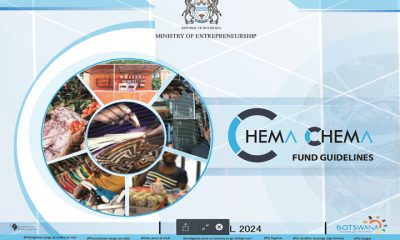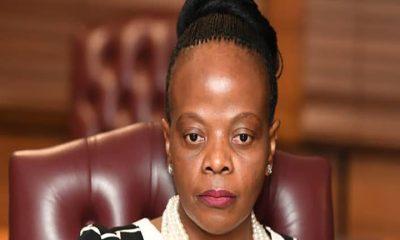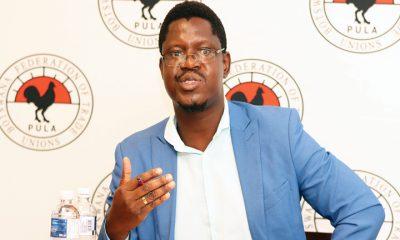Masisi finally moves to P10 million renewed State House
President Mokgweetsi Masisi will finally move to his official residence, the State House, after mysterious refurbishments that lasted for more than two years. The renovations cost tax payers P10 million and were conducted following the exit of former President Lt Gen Ian Khama from the country’s number one residence.
Since Khama’s departure, Masisi has remained in the Vice President’s official residence while VP Slumber Tsogwane is occupying the Ministerial house. It is understood that after Khama’s departure, the State House was found to be leaking mysteriously on two separate occasions.
[ihc-hide-content ihc_mb_type=”show” ihc_mb_who=”1,2,3″ ihc_mb_template=”1″ ]
“What is now happening is that after the former President left the State House there were renovations undertaken involving even structural modifications here and there. When we thought we were done with fixing in December it rained and the whole house was leaking. And we had to fix the roof which was an issue that was not within the scope of works,” Thuso Ramodimoosi, Permanent Secretary in the Ministry of Presidential Affairs, Governance and Public Administration confirmed this week.
He was testifying before an inquisitive panel of lawmakers who are members of the robust parliamentary Public Accounts Committee (PAC). Ramodimoosi continued: “We thought then we were done with that, and early this year (2020) the President was supposed to move in around April and May and in fact he had already moved his belongings, but all of a sudden it started to leak again (for the second time) after another round of rains. It’s disheartening.”
The PS further explained that all in all, the delay was caused by the leaking roof and modifying the State House structure to avoid total collapse at one point.“This State House is very old as we may know. And I think we can all guess even though we are not architects that when you have an old structure and keep on modifying, adding and fixing that, the potential risk eventually is that the whole structure may collapse,” he said justifying the delay and the fat budget.
On the budget, he said: “Yes, we have spent approximately P10 million in fixing the building which seems to have long surpassed its lifespan,” much to the amazement of committee members while adding that, “I am not aware of a new State House being built outside the Gaborone city” amid allegations that a new State House was being built for Masisi “for security reasons” in the vicinity of Gaborone.
There were reports that they was a debugging exercise to remove spying equipment from the house. It is understood that in 2008 similar renovations were also made to the State House at a cost of another 10 million when former President Khama moved in.
Reports indicate that developments conducted then included the conversions of the old serious crime squad offices to provide accommodation for the Botswana Defence Force (BDF) sentries at the State House, housing approximately 60 officers. The building was also to have a commander’s office, armoury, radio room, kitchen, dining room and gym.
Masisi had a deal with Khama before exiting State House
According to the PS in the Office of the President, Masisi had a deal with Khama that led to the latter getting “more” than he was entitled to. This comes after there was a scuffle between OP and Khama’s office on the issue of how many staff he had or was entitled to. They reduced the number of staff he had to line it with the current law of former presidents.
“So during the transition, it appears there was an arrangement, which led to the former President having more than what he is actually entitled to as per the law,” Ramodimoosi pointed out. He added that he has read Pensions and Benefits Act for retired presidents which was passed by parliament. “It’s very explicit. It states what a former head of State is entitled to. Staff, among others and how many. It’s in the law. Vehicles and what type of vehicles, it’s all in that law,” he highlighted.
Khama to finally get his preferred Private Secretary – OP
On the issue of the Private Secretary, after government rejected Khama’s two separate choices being his former Private Secretary George Tlhalerwa and former Intelligence boss Isaac Kgosi, the OP official said Khama now has his preferred.
“I was not directly involved in the issue of the appointment of the Private Secretary for the former President but what I can say is that the matter I think is now water under the bridge. That is as far as I know. The latest is that for his office, there were names that were suggested and to my knowledge they have been accepted,” he confirmed to the PAC this week.
This comes after Khama turned down OP’s choice of Loeto Porati, who is former acting Director of Tribal Administration and also former District Commissioner for North East District Council – to replace Mabedi Letsholo who has been acting Private Secretary since then.
When grilled why it took this long, he stressed he was not directly involved and therefore does not know why it took this long but insisted he is happy now that this is now water under the bridge and therefore as government can now move forward to deal with strategic issues of governance and others.
P75 million refurbished Orapa House not used for 8 years and counting
The Committee was also informed that Orapa House which was supposed to house the Office of the President in 2012 continues to be a white elephant. “The building has been there for 8 years. It was bought in 2012. It cost government P75 million. It is not used to the optimum best now. There have been an in-house discussions to see how we can use it optimally utilised,” OP official said.
Ramodimoosi believes that the assessment that was done at that time informed the need to purchase the building and once they have made an assessment and mapping out a strategy and way forward, they look at a lot of factors like resources, and they as well appraised their decision, strategy and revised/ reviewed it.
He justified that what he knows is that when one looks at the buildings in the city, they are not many that really can house or be used for what OP wanted to use it for. He continued: “There has been some partitioning done at the place. It’s a tenth floor building. When you look up you will see that it’s a hollow up. On the side its platforms that were used for sorting the diamonds. There are tables around on each floor. Lifts don’t work.”
He added: “Really when you want to turn that building into an office, it means you need to re-design it, inside and do partitioning, and so forth.” Ramodimoosi insisted that structurally Orapa House is a solid and strong structure, inside and outside and that is why OP needed someone with a technical expertise to ascertain that, and as such the consultant was to make it fit for purpose and address ceilings, electricals, plumbing, and so forth.
However, the P75 million house still remain unoccupied.[/ihc-hide-content]
News
Nigerians, Zimbabweans apply for Chema Chema Fund

Fronting activities, where locals are used as a front for foreign-owned businesses, have been a long-standing issue in Botswana. These activities not only undermine the government’s efforts to promote local businesses but also deprive Batswana of opportunities for economic empowerment, officials say. The Ministry of Trade and Industry has warned of heavy penalties for those involved in fronting activities especially in relation to the latest popular government initiative dubbed Chema Chema.
According to the Ministry, the Industrial Development Act of 2019 clearly outlines the consequences of engaging in fronting activities. The fines of up to P50,000 for first-time offenders and P20,000 plus a two-year jail term for repeat offenders send a strong message that the government is serious about cracking down on this illegal practice. These penalties are meant to deter individuals from participating in fronting activities and to protect the integrity of local industries.
“It is disheartening to hear reports of collaboration between foreigners and locals to exploit government initiatives such as the Chema Chema Fund. This fund, administered by CEDA and LEA, is meant to support informal traders and low-income earners in Botswana. However, when fronting activities come into play, the intended beneficiaries are sidelined, and the funds are misused for personal gain.” It has been discovered that foreign nationals predominantly of Zimbabwean and Nigerian origin use unsuspecting Batswana to attempt to access the Chema Chema Fund. It is understood that they approach these Batswana under the guise of drafting business plans for them or simply coming up with ‘bankable business ideas that qualify for Chema Chema.’
Observers say the Chema Chema Fund has the potential to uplift the lives of many Batswana who are struggling to make ends meet. They argue that it is crucial that these funds are used for their intended purpose and not siphoned off through illegal activities such as fronting. The Ministry says the warning it issued serves as a reminder to all stakeholders involved in the administration of these funds to ensure transparency and accountability in their disbursement.
One local commentator said it is important to highlight the impact of fronting activities on the local economy and the livelihoods of Batswana. He said by using locals as a front for foreign-owned businesses, opportunities for local entrepreneurs are stifled, and the economic empowerment of Batswana is hindered. The Ministry’s warning of heavy penalties is a call to action for all stakeholders to work together to eliminate fronting activities and promote a level playing field for local businesses.
Meanwhile, the Ministry of Trade and Industry’s warning of heavy penalties for fronting activities is a necessary step to protect the integrity of local industries and promote economic empowerment for Batswana. “It is imperative that all stakeholders comply with regulations and work towards a transparent and accountable business environment. By upholding the law and cracking down on illegal activities, we can ensure a fair and prosperous future for all Batswana.”
News
Merck Foundation and African First Ladies mark World Health Day 2024

Merck Foundation, the philanthropic arm of Merck KGaA Germany marks “World Health Day” 2024 together with Africa’s First Ladies who are also Ambassadors of MerckFoundation “More Than a Mother” Campaign through their Scholarship and Capacity Building Program. Senator, Dr. Rasha Kelej, CEO of Merck Foundation emphasized, “At Merck Foundation, we mark World Health Day every single day of the year over the past 12 years, by building healthcare capacity and transforming patient care across Africa, Asia and beyond.
I am proud to share that Merck Foundation has provided over 1740 scholarships to aspiring young doctors from 52 countries, in 44 critical and underserved medical specialties such as Oncology, Diabetes, Preventative Cardiovascular Medicine, Endocrinology, Sexual and Reproductive Medicine, Acute Medicine, Respiratory Medicine, Embryology & Fertility specialty, Gastroenterology, Dermatology, Psychiatry, Emergency and Resuscitation Medicine, Critical Care, Pediatric Emergency Medicine, Neonatal Medicine, Advanced Surgical Practice, Pain Management, General Surgery, Clinical Microbiology and infectious diseases, Internal Medicine, Trauma & Orthopedics, Neurosurgery, Neurology, Cardiology, Stroke Medicine, Care of the Older Person, Family Medicine, Pediatrics and Child Health, Obesity & Weight Management, Women’s Health, Biotechnology in ART and many more”.
As per the available data, Africa has only 34.6% of the required doctors, nurses, and midwives. It is projected that by 2030, Africa would need additional 6.1 million doctors, nurses, and midwives*. “For Example, before the start of the Merck Foundation programs in 2012; there was not a single Oncologist, Fertility or Reproductive care specialists, Diabetologist, Respiratory or ICU specialist in many countries such as The Gambia, Liberia, Sierra Leone, Central African Republic, Guinea, Burundi, Niger, Chad, Ethiopia, Namibia among others. We are certainly creating historic legacy in Africa, and also beyond. Together with our partners like Africa’s First Ladies, Ministries of Health, Gender, Education and Communication, we are impacting the lives of people in the most disadvantaged communities in Africa and beyond.”, added Senator Dr. Kelej. Merck Foundation works closely with their Ambassadors, the African First Ladies and local partners such as; Ministries of Health, Education, Information & Communication, Gender, Academia, Research Institutions, Media and Art in building healthcare capacity and addressing health, social & economic challenges in developing countries and under-served communities. “I strongly believe that training healthcare providers and building professional healthcare capacity is the right strategy to improve access to equitable and quality at health care in Africa.
Therefore, I am happy to announce the Call for Applications for 2024 Scholarships for young doctors with special focus on female doctors for our online one-year diploma and two year master degree in 44 critical and underserved medical specialties, which includes both Online Diploma programs and On-Site Fellowship and clinical training programs. The applications are invited through the Office of our Ambassadors and long-term partners, The First Ladies of Africa and Ministry of Health of each country.” shared Dr . Kelej. “Our aim is to improve the overall health and wellbeing of people by building healthcare capacity across Africa, Asia and other developing countries. We are strongly committed to transforming patientcare landscape through our scholarships program”, concluded Senator Kelej.
News
Interpol fugitive escapes from Botswana

John Isaak Ndovi, a Tanzanian national embroiled in controversy and pursued under a red notice by the International Criminal Police Organization (Interpol), has mysteriously vanished, bypassing a scheduled bail hearing at the Extension 2 Magistrate Court in Gaborone. Previously apprehended by Botswana law enforcement at the Tlokweng border post several months earlier, his escape has ignited serious concerns.
Accused of pilfering assets worth in excess of P1 million, an amount translating to roughly 30,000 Omani Riyals, Ndovi has become a figure of paramount interest, especially to the authorities in the Sultanate of Oman, nestled in the far reaches of Asia.
The unsettling news of his disappearance surfaced following his failure to present himself at the Extension 2 Magistrate Court the preceding week. Speculation abounds that Ndovi may have sought refuge in South Africa in a bid to elude capture, prompting a widespread mobilization of law enforcement agencies to ascertain his current location.
In an official communiqué, Detective Senior Assistant Police Commissioner Selebatso Mokgosi of Interpol Gaborone disclosed Ndovi’s apprehension last September at the Tlokweng border, a capture made possible through the vigilant issuance of the Interpol red notice.
At 36, Ndovi is implicated in a case of alleged home invasion in Oman. Despite the non-existence of an extradition treaty between Botswana and Oman, Nomsa Moatswi, the Director of the Directorate of Public Prosecution (DPP), emphasized that the lack of formal extradition agreements does not hinder her office’s ability to entertain extradition requests. She highlighted the adoption of international cooperation norms, advocating for collaboration through the lenses of international comity and reciprocity.
Moatswi disclosed the intensified effort by law enforcement to locate Ndovi following his no-show in court, and pointed to Botswana’s track record of extraditing two international fugitives from France and Zimbabwe in the previous year as evidence of the country’s relentless pursuit of legal integrity.
When probed about the potential implications of Ndovi’s case on Botswana’s forthcoming evaluation by the Financial Action Task Force (FATF), Moatswi reserved her speculations. She acknowledged the criticality of steering clear of blacklisting, suggesting that this singular case is unlikely to feature prominently in the FATF’s assessment criteria.













